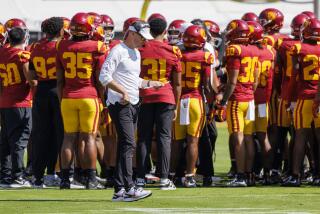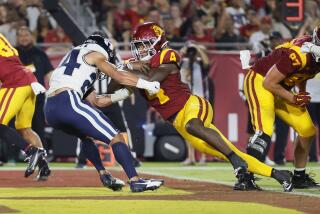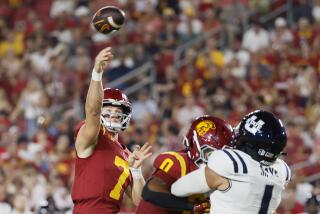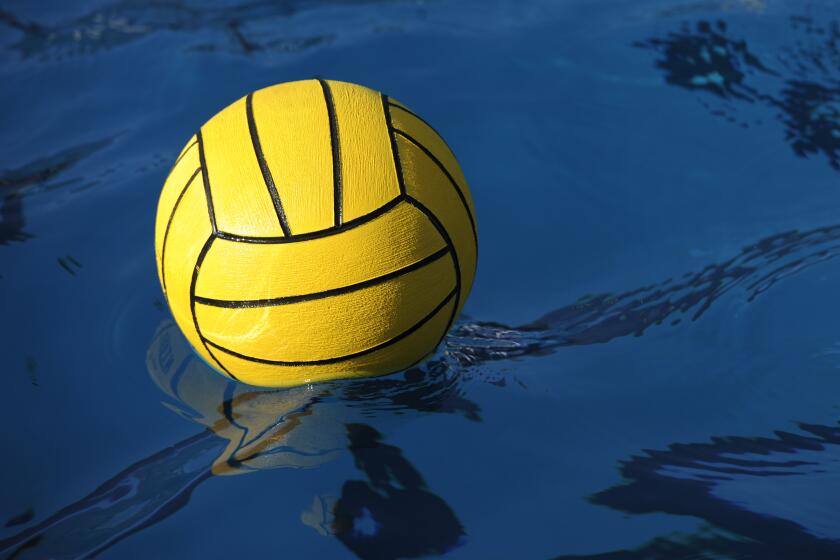Trojans need to get better, because opponents will be
After playing four of its first six games on the road, USC finishes the season with five of six in Southern California.
But except for Saturday’s game against Colorado at the Coliseum, the quality of opponent the No. 11 Trojans will face in the second half of the season appears markedly better.
USC’s first six opponents — Hawaii, Syracuse, Stanford, California, Utah and Washington — are a combined 15-22. Only Stanford, which defeated USC, has a winning record.
The Trojans’ next six opponents – Colorado, Arizona, Oregon, Arizona State, UCLA and Notre Dame —are a combined 26-11. Colorado, at 1-5, is the only one with a losing record.
USC’s 24-14 victory over Washington last week improved the Trojans to 5-1 overall and 3-1 in the Pac-12 Conference.
“We’re not satisfied,” running back Silas Redd said after the game.
USC is 10th in the first Bowl Championship Series standings, but the Trojans must shore up several areas if they hope to make a run to a conference title and BCS bowl game.
Improving third-down efficiency and pass defense and cutting down penalties are three areas of immediate focus, Coach Lane Kiffin said.
Among 120 major college teams, USC ranks 112th in third-down efficiency, converting only 30%. The Trojans were two for 12 against Washington, Kiffin contributing to that by going conservative and calling running plays instead of Matt Barkley passes in several third-and-long situations.
USC has averaged 10 penalties a game, more than any other major college team. Kiffin has talked for weeks about fixing the problem, but the Trojans have been flagged 24 times in their last two games.
“We’re not doing a very good job of playing with a great composure,” he said. “And we’ve got to coach better.”
The Trojans have given up 220.8 yards passing per game, ranking 54th nationally.
“Even though we’ve played better at times, we know what’s coming,” Kiffin said. “If you pull up the stats of who we’ve played passing-wise compared to who’s coming, there are some really good passing offenses and some really good offenses in general coming.”
Arizona ranks fourth nationally in total offense, Oregon eighth, UCLA 16th and Arizona State 24th.
And what of the Trojans’ offense?
Kiffin said Sunday that he understood fans’ frustration with the performance of a unit that ranks 57th after coming into the season with high expectations.
The Trojans have averaged 415.2 yards in total offense — 165.7 yards rushing, 249.5 passing — and 32.3 points a game.
But Kiffin anticipates improvement.
“I would assume, if you took our numbers halfway through last year, our last half of the year was much better than the first half,” Kiffin said.
Through six games in 2011, USC averaged 430.8 yards in total offense — 133.5 rushing, 297.3 passing — and 30 points a game.
USC finished the season averaging 456.8 yards — 162.6 yards rushing, 294.2 passing — and 35.8 points.
Williams rising
Defensive linemen have accounted for 21 of USC’s 22 sacks.
Junior end Morgan Breslin has a team-high seven, freshman tackle Leonard Williams 51/2.
The 6-foot-5, 270-pound Williams, from Daytona Beach, Fla., started for the second consecutive game against Washington and had 1½ sacks.
“He’s the real deal,” Kiffin said. “He’s what they line up with down in the SEC, so we need to get more guys like him, obviously.”
Quick hits
USC’s Oct. 27 game at Arizona will kick off at 12:30 p.m. and will be televised by ABC or ESPN 2, USC announced. . . . The Trojans resume practice Tuesday.
More to Read
Go beyond the scoreboard
Get the latest on L.A.'s teams in the daily Sports Report newsletter.
You may occasionally receive promotional content from the Los Angeles Times.











